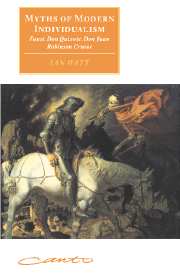Book contents
Some Notes on the Present
Published online by Cambridge University Press: 24 November 2009
Summary
John Stuart Mill wrote in his Autobiography in 1873 that his father, James, relied so much
on the influence of reason over the minds of mankind, whenever it is allowed to reach them, that he felt as if all would be gained if the whole population were taught to read, if all sorts of opinions were allowed to be addressed to them by word and in writing, and if by means of the suffrage they could nominate a legislature to give effect to the opinions they adopted.
John Stuart Mill's essay On Liberty is one of the few canonical texts among the gospels of individualism; but as regards politics, John Stuart was less sanguine than his father. And so are we, no doubt: in the USA and Britain, school education has been compulsory, and the franchise has been extended to cover the whole population, since early in the twentieth century; but “all” has not, alas, “been gained.”
The reasons are, no doubt, innumerable; but two are particularly relevant to our concern.
The first is James Mill's enormous over-estimate of the power of reason in both the individual and the collective life. The enemy of reason, of course, is what used to be called “the passions”; and more recently the power of “the passions” has been strengthened by our new awareness of the vast influence of the unconscious in human life.
- Type
- Chapter
- Information
- Myths of Modern IndividualismFaust, Don Quixote, Don Juan, Robinson Crusoe, pp. 267 - 276Publisher: Cambridge University PressPrint publication year: 1996

